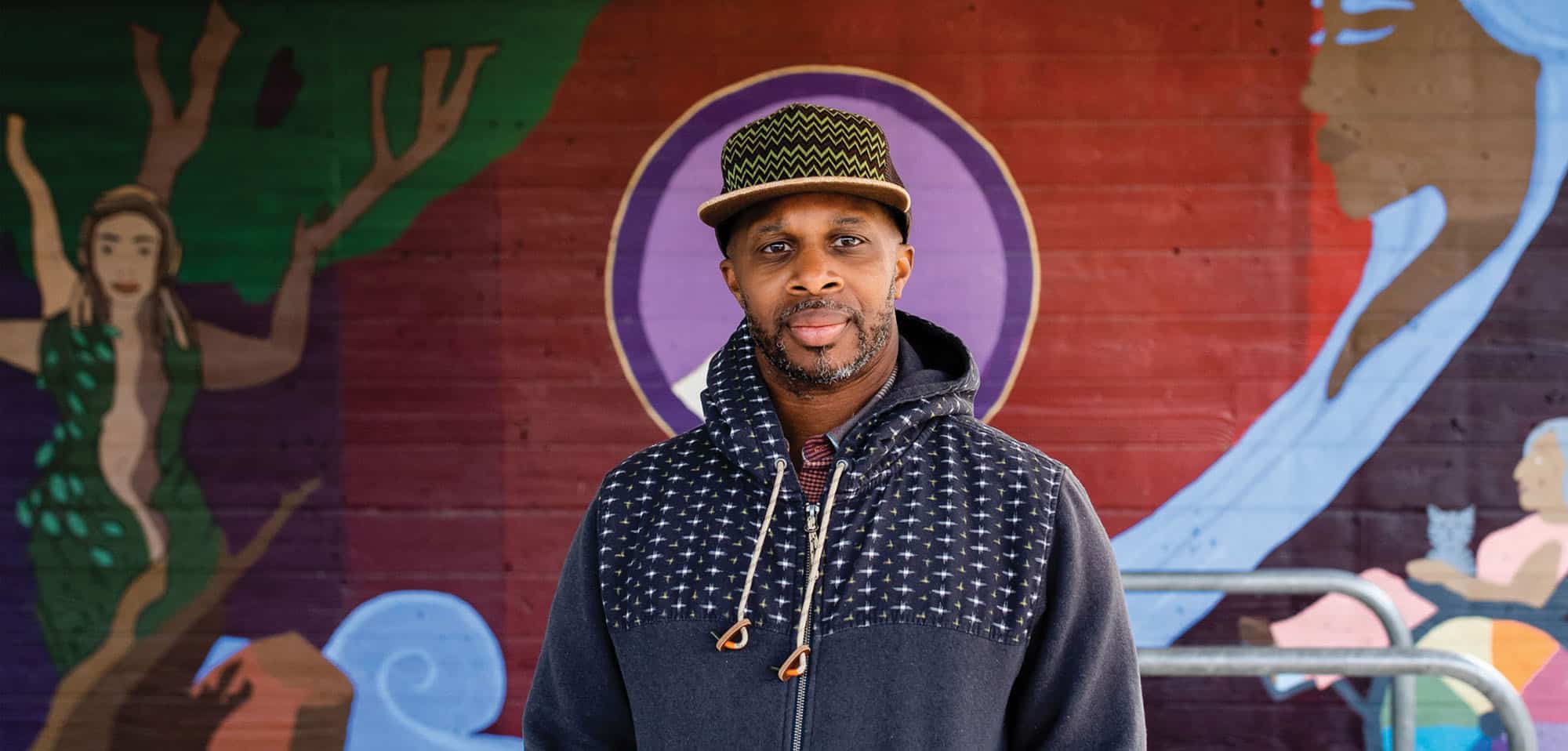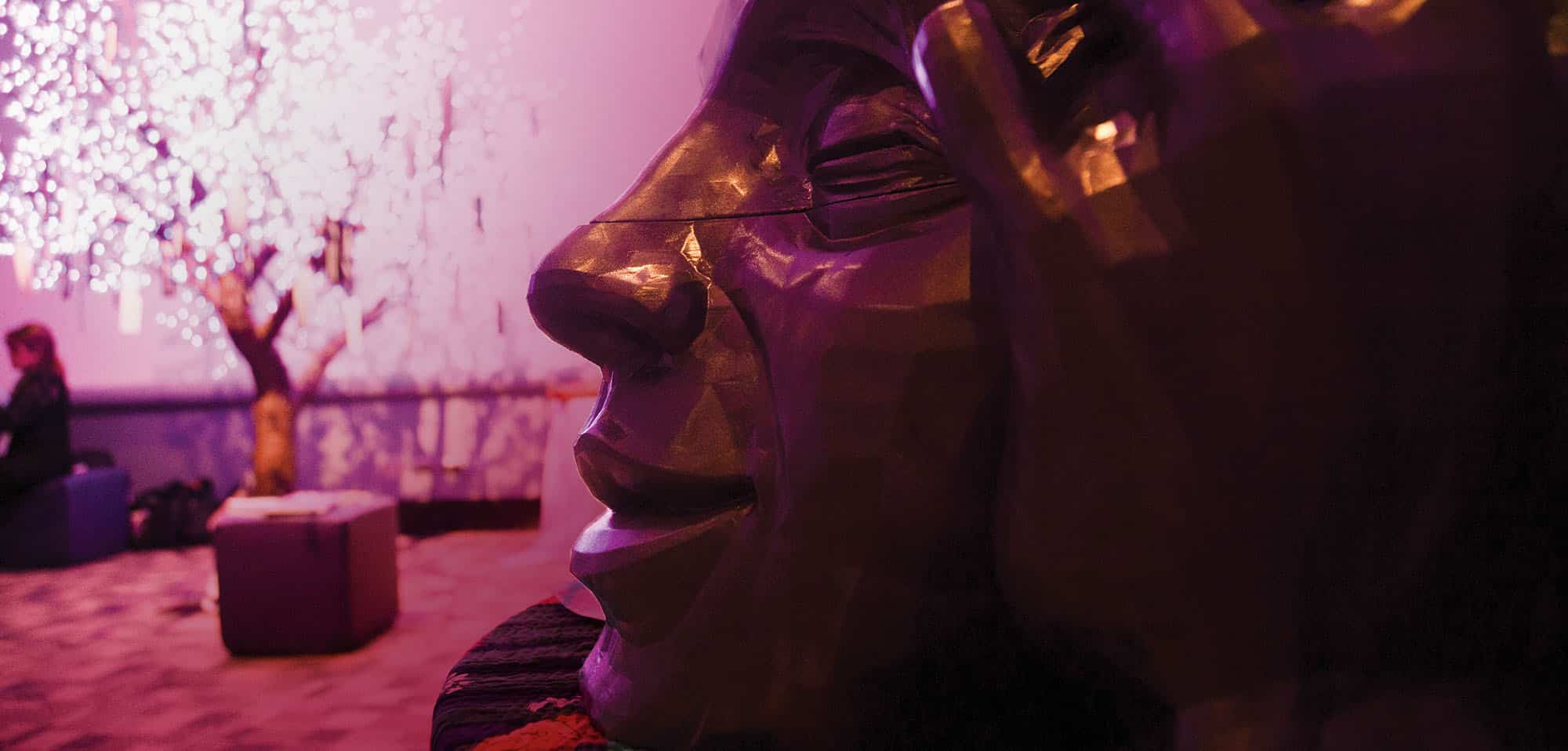With contributions from Seann Goodman.
What Arises When Contemplative Space Is Held in Higher Education
At the core of Naropa is the belief that we must transform ourselves in order to transform the world, and the division of Mission, Culture, and Inclusive Community (MCIC) serves as the institutional guardian of this heart.
MCIC is a multi-departmental division charged with upholding Naropa’s commitment to its purpose, mission, vision, and values, also known as the Community Compass. At the center of the Community Compass is an understanding that contemplative practice can bolster our ability to face individual and collective challenges. Many of the collective challenges faced today are in response to social justice and sustainability rallying cries, as well as an increased polarization around the way people feel about and understand these matters.
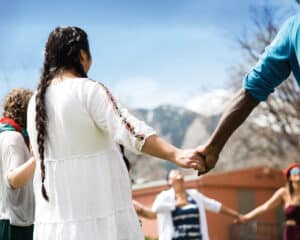
At Naropa, the divisions responsible for upholding our commitments to social justice, sustainability, contemplative practice, and restorative community merged into one department, MCIC. Unifying these fields within a single division allows each unit to integrate the paradigms of the others into their initiatives. This holistic approach is unique— especially in the world of higher education, and it works to dissolve the illusory barriers between these fields and catalyze action toward a more interconnected and enlightened society.
Naropa’s approach to inclusivity is distinct because of the centers that round out the division. Recognizing their interdependence, Naropa officially merged the Diversity, Equity, and Inclusion office with the Center for the Advancement of Contemplative Education (CACE), Joanna Macy Center for Resilience and Regeneration (JMCR), and Restorative and Inclusive Community in the summer of 2020.
CACE’s role in the department is to lay the ground for a foundation of contemplative practice in all MCIC endeavors. Contemplative practices can be defined as practices that cultivate mindfulness such as meditation, yoga, movement, prayer, making art and music, etc. Charlotte Rotterdam, Director of CACE, speaks to the way there are many flavors and forms of contemplative practice, but “across traditions, contemplative practice is about waking up and becoming aware.”
“What arises when we wake up? We become fully present. We see more, we feel more, and we understand more. Our inherent goodness and compassion wake up as well. So, contemplative practice, while on one hand, is very personal; it’s actually always about others. It awakens our inherent compassion and connectedness to each other and all beings in the world….”
Awakening compassion and connection through contemplative practice inspires humans to make ethical, skillful, and sustainable changes, so they can take better care of each other and the planet. Planetary care served as the fertilizer for the next center into MCIC—so the Office of Sustainability coalesced with the Joanna Macy Center to become the JMCR. The visionary scholarship of Joanna Macy, PhD, provides a framework for environmental activism, rooted in Buddhist spirituality and contemporary science, and Naropa is the only academic institution to inherit her body of work. With climate goals such as zero waste and carbon neutrality by 2040, the JMCR leads a regenerative approach to sustainability.
For the future of humanity, all of us are needed....Everyone of all faiths and kinds needs to be there. It’s not easy, and conflict will naturally happen, but we are at our best when we can hold that conflict with courage.
Plenty of research documents the practical steps needed to support the planet and historically marginalized members of society, but even positive change can bring discomfort and challenge. This need for a space responsible for regenerative conflict resolution solidified Restorative and Inclusive Community as the final pillar of MCIC. Restorative processes help community members engage conflict mindfully, so they can harness conflict’s restorative benefits.
Restorative community starts from the founding principle that everyone deserves to be held with love and compassion. This includes people who have caused harm, as it can be more harmful to the community to “cancel” or isolate others. Restorative dialogues work to help people who experienced harm share what happened to them, so those who committed harm can take accountability, and agreements can be made for future action together
“For the future of humanity, all of us are needed,” shares Jamelah Zidan, Special Assistant to the Chief of Staff at Naropa. “Everyone of all faiths and kinds needs to be there. It’s not easy, and conflict will naturally happen, but we are at our best when we can hold that conflict with courage.”
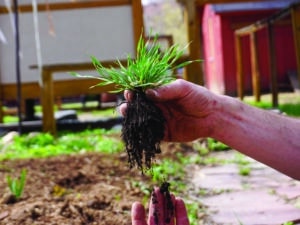
Maintaining solidarity within a community despite the myriad reasons society offers for division is a daunting task. However, embracing conflict’s regenerative ability lets MCIC lean into Dr. Martin Luther King Jr.’s vision of a Beloved Community.
“Beloved Community” is a term popularized by King, representing his “global vision, in which all people can share in the wealth of the earth” (The King Center). Conflict is to be expected in a Beloved Community, but King believed conflicts can be resolved peacefully. In his 1957 speech “Birth of A New Nation,” King illustrates the emergence of a Beloved Community. “The aftermath of nonviolence is the creation of the beloved community. The aftermath of nonviolence is redemption. The aftermath of nonviolence is reconciliation” (The King Center).
Every week, MCIC sends out the Beloved Community newsletter to Naropa students, faculty, and staff. The newsletter contains weekly practice sessions, workshops, guest lectures, and events that support mission integration within the university and shape community partnerships beyond Naropa. MCIC also holds space for students of color to speak about their experiences—the group Students of Color and Allies (SOCA) formed as an offshoot to MCIC. It’s open to students, staff, faculty, and alumnx and focuses on creating a supportive space of rest and renewal for students of color.
“What we’re trying to do here is actually shape society; it’s a ripple effect,” emphasizes Seann Goodman, Director of MCIC. “What we do here matters because our students are going to leave with the skills, knowledge, and courage to go out into the world and meet the challenges of our times.”
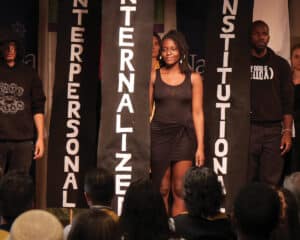
Naropa has been responding to contemporary social issues through a holistic lens since the university’s founding in 1974, when the end of the Civil Rights era converged with the hippie movement in the heat of the Vietnam War. Naropa Institute provided refuge for countercultural luminaries, social outcasts, and critical thinkers of all kinds. A framework for conflict resolution and nonviolent communication formed alongside the foundation of the school, so when the Black Lives Matter movement of the 2010s led to nationwide protests in 2020, Naropa doubled down on its commitment to justice, equity, diversity, and inclusion (JEDI) work.
MCIC formed officially in the summer of 2020 on the heels of political unrest nationwide marked by the deaths of George Floyd and Breanna Taylor among countless other Black citizens at the hands of police brutality. However, the roots of MCIC’s inception date back to the spring of 2015, when Naropa student activists occupied the Arapahoe Campus Green where they pitched tents under the sycamore trees and camped for more than 40 days, demanding the university hold itself accountable for institutional racism in a protest known in Naropa lore as “Decolonize the Commons.”
I think we accept ideas of the status quo because we’re suffering from a failure of the imagination.... In order to get out of this kind of depressed state many of us are feeling globally, we have to think more radically about what’s possible.
As protests on campus garnered community attention, Regina Smith, an academic advisor at the time and participant on the University Diversity Committee, was asked to step in to fill the vacant role of the Director of Diversity. Smith facilitated conversations between students and university leadership while the students demanded all aspects of the university, from top down, examine their roles in propagating white supremacy, systems of oppression, marginalization, and institutional racism.
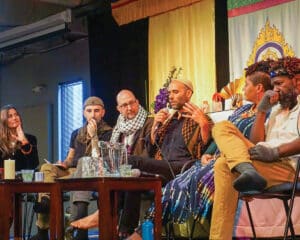
The protest propelled the entire community to examine their own culpability as either conscious or unconscious bystanders of historic social conditioning. Demands positioned around the Four I’s of Oppression, a theory that examines ideological, institutional, interpersonal, and internalized oppression. These pillars of the Decolonize Commons movement laid the ground for the next 10 years of institutional growth in the field of JEDI at Naropa.
“Universities become a place of radical beliefs because you have time to sit with the records of human history, as well as see potential alternatives,” elucidates Ramon Gabrieloff-Parish, Associate Professor of Interdisciplinary Studies and faculty support for MCIC. Gabrieloff-Parish calls on Naropa to continue to have courage and lean into its uniqueness as a university:
“In our DNA, Naropa has a belief that everyone, that reality itself, is basically good; that underneath the confusion, there is wholeness. We have an opportunity to move past duality right now, to enliven a justice movement that goes beyond a fixation on targets and enemies; to recognize the oppressed of today can become the oppressors of tomorrow and that all of us have the capacity to break these cycles and become liberated beings.”
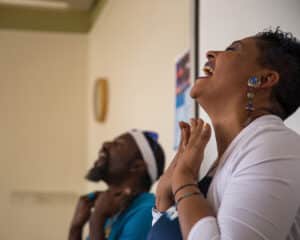
Humanity is at a point in history where the self in society is no longer able to walk alone. These times call for a recognition of interdependence and a reimagination of what’s possible.
“I think we accept ideas of the status quo because we’re suffering from a failure of the imagination,” recognizes Smith, now Vice President of MCIC and the President’s Chief of Staff at Naropa. “In order to get out of this kind of depressed state many of us are feeling globally, we have to think more radically about what’s possible.”
Through the frameworks of Afrofuturism and Ethno- Ancestral Futurism, MCIC guides the community to connect with the power of intergenerational strength as a key to a future of collective liberation. Drawing upon ancestral wisdom equips MCIC with the resilience to look beyond and dream a new world for future generations.
With social justice, environmental stewardship, contemplative practice, and restorative community as its pillars, MCIC is reimagining what’s possible when the call for personal and collective liberation exists in a Beloved Community.

